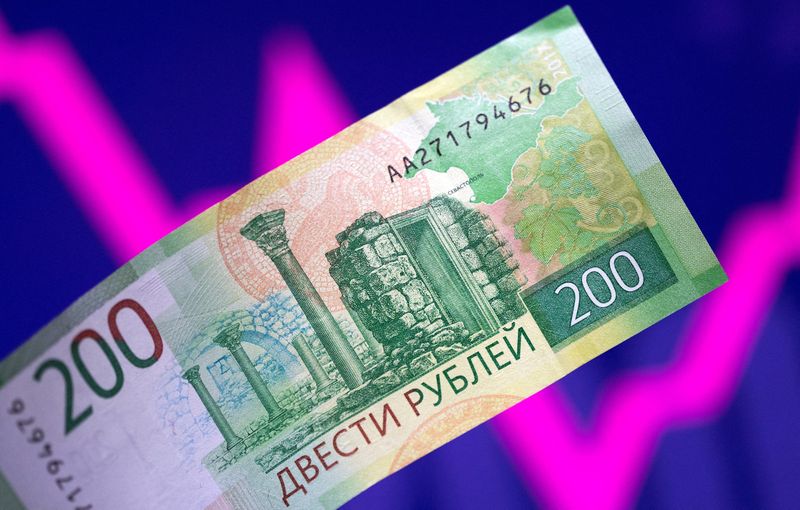LONDON -The risk of a Russian debt default is turning attention to the insurance policies known as Credit Default Swaps (CDS) that investors take out for this kind of situation.
Here is how CDS work and why the situation in Russia means the situation might be more complicated than normal.
WHAT ARE CREDIT DEFAULT SWAPS?
CDS are similar to an insurance contract, providing the buyer with protection against specific risks.
Investors often buy them for protection against a default on a specific bond they have bought, but they are flexible and can be customised to cover various scenarios, timeframes or multiple countries, companies or banks all at once.
HOW DO YOU BUY A CDS?
CDS are sold by many of the world’s big investment banks as investors want to hedge their risk when they buy a bond. The cost depends on risk of not getting paid back.
WHEN DO THESE INSURANCE POLICIES PAY OUT?
The process starts with a market participant, usually an investor who has bought a CDS, asking a group known as the Credit Derivatives Determinations Committee https://www.cdsdeterminationscommittees.org/about-dc-committees(DC), to look at whether a default or ‘credit event’ has happened.
There are five DCs https://www.cdsdeterminationscommittees.org/about-dc-committees/current-dc-membersdc-members-april-2021-to-april-2022/#EMEA for different parts of the world. They can have up to 15 voting members https://www.cdsdeterminationscommittees.org/about-dc-committees/current-dc-membersdc-members-april-2021-to-april-2022/#EMEA made up mainly of the big banks and investment funds that use or sell CDS such as Goldman Sachs, JPMorgan, Bank of America, PIMCO and Citadel.
Their role of the DC is to apply the definitions of what constitutes a default to the specific circumstances, and make “factual, evidence-based determinations”.
There are five commonly-established scenarios where non-payment occurs. Those are bankruptcy, a failure to pay, a debt restructuring, an obligation acceleration of default – where a payment might be triggered by a default on another bond, and finally a repudiation or moratorium – where the borrower is effectively refusing to pay.
WHAT HAPPENS THEN?
If it is agreed that a non-payment event has happened, the CDS contract should pay out, the investor has the right to hand over their bond to the CDS seller and receive 100% of the bond’s ‘par’ value in return.
In case the investor didn’t actually have the bonds, they need to buy them from someone who does. That process is facilitated by what is known as the CDS bond “auction” when participants look at the bond markets and try to work out what the defaulted assets are worth.
A cash settlement instead of physical settlement is normally an alternative if it proves tricky.
WHY IS THIS SITUATION COMPLICATED?
There is a potential snag in that key ‘settlement’ part of the process.
That’s because six of out Russia’s 15 dollar- or euro-denominated international market bonds have legal fine print which allows the government to make its bond payments in roubles if “the Russian Federation is unable to make payments of principal or interest (in whole or in part) in respect of the bonds in U.S. dollars”.
If Moscow uses that ‘fallback’ option it will create headaches as Western sanctions make it hard to convert the roubles back into dollars or euros at the moment. Further sanctions that banned Russian bond trading altogether would make it impossible for bondholders to deliver their defaulted bonds to the CDS sellers, meaning the sellers could argue they shouldn’t have to pay out.
WHEN MIGHT RUSSIA DEFAULT AND KICK ALL THIS PROCESS OFF?
Russia’s next ‘hard currency’ bond payments are two ‘coupon’ or regular interest payments due on March 16. They have what are known as 30-day grace periods, which means a default would formally happen on April 15.
The CDS determinations committee has already, however, been asked to look at what could happen for those bonds with the rouble fallback option.
HOW MUCH MONEY IS AT STAKE?
Investment bank JPMorgan estimates there is roughly $6 billion worth of outstanding CDS that would need to pay out.
For investors though that bought the insurance for their Russian bonds it is likely to avoid a huge hole in their pockets. Some could even make a profit as the fact the risk of default was seen as extremely low before this crisis meant that CDS were cheap.
(Reporting by Marc Jones; Editing by Toby Chopra)
